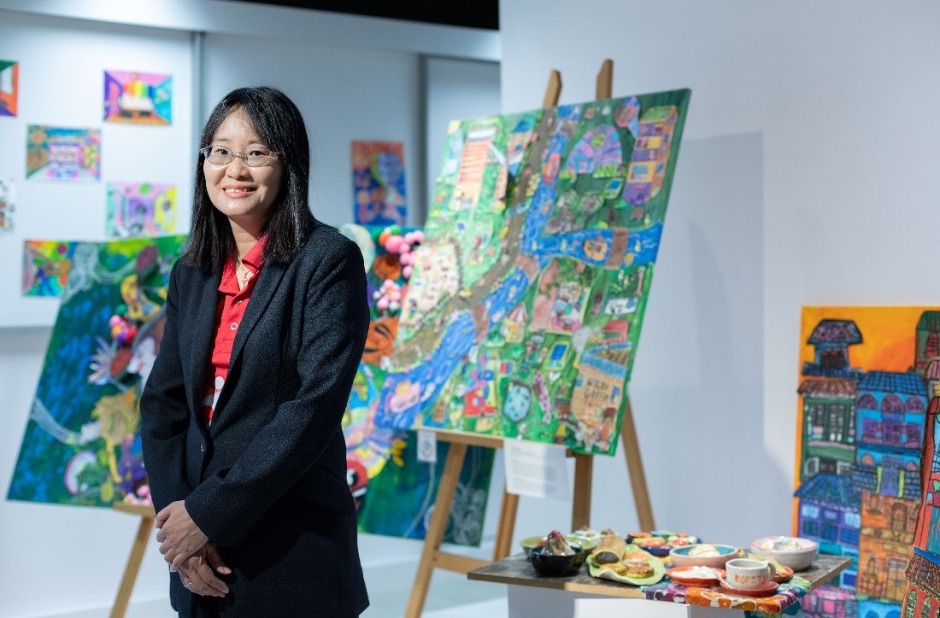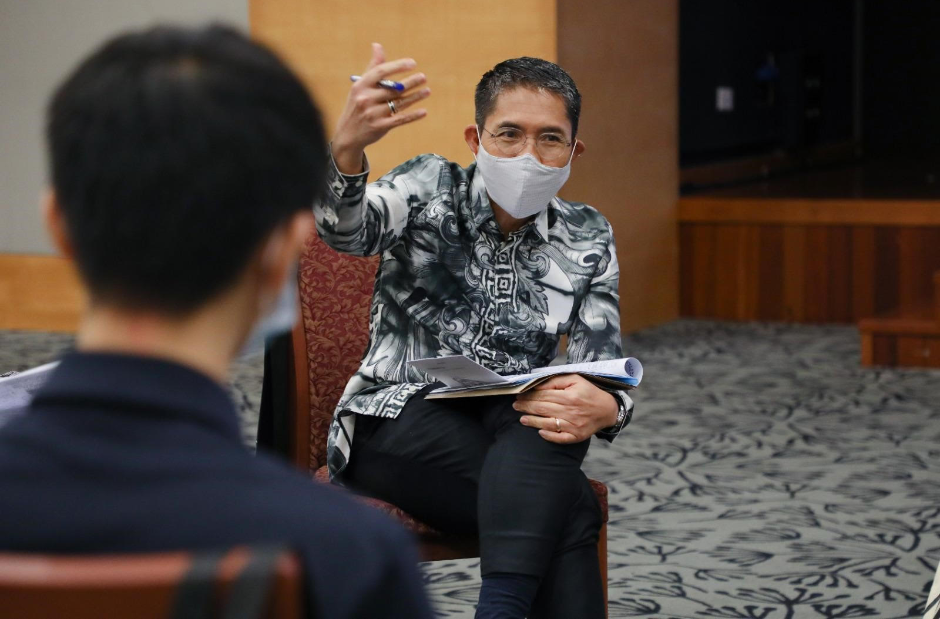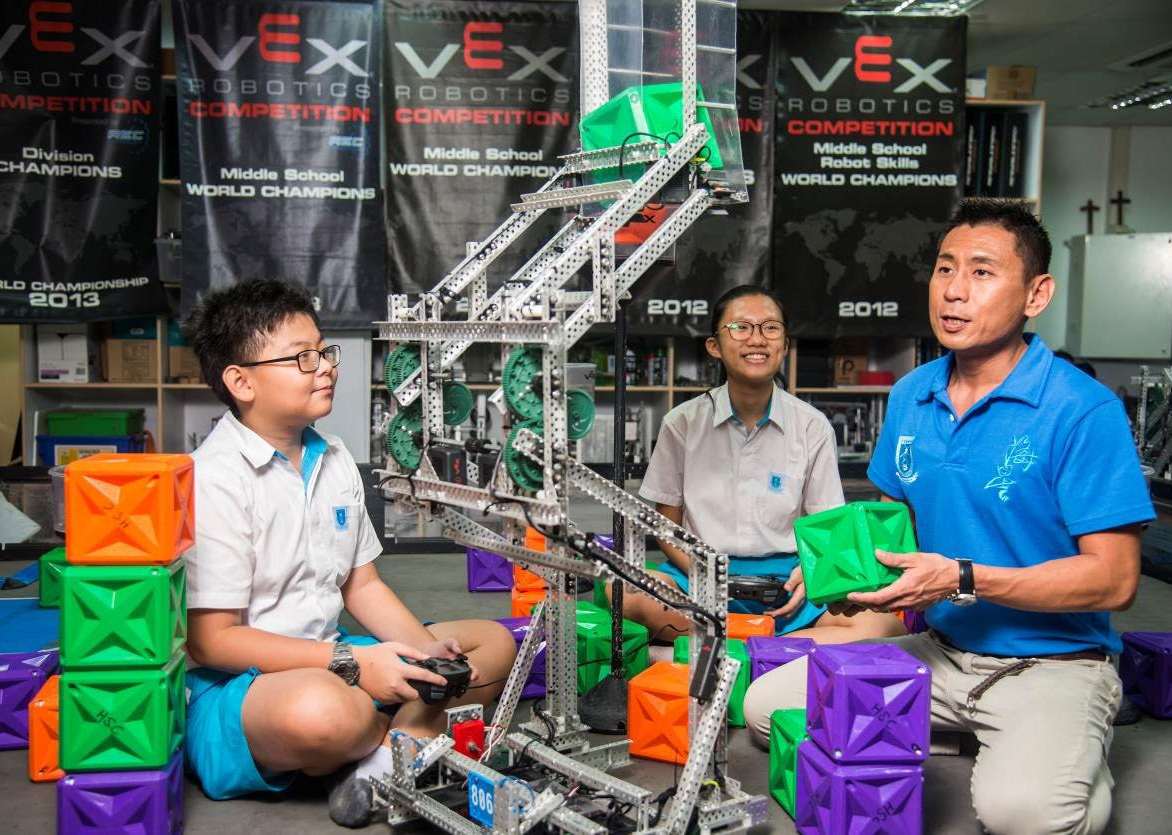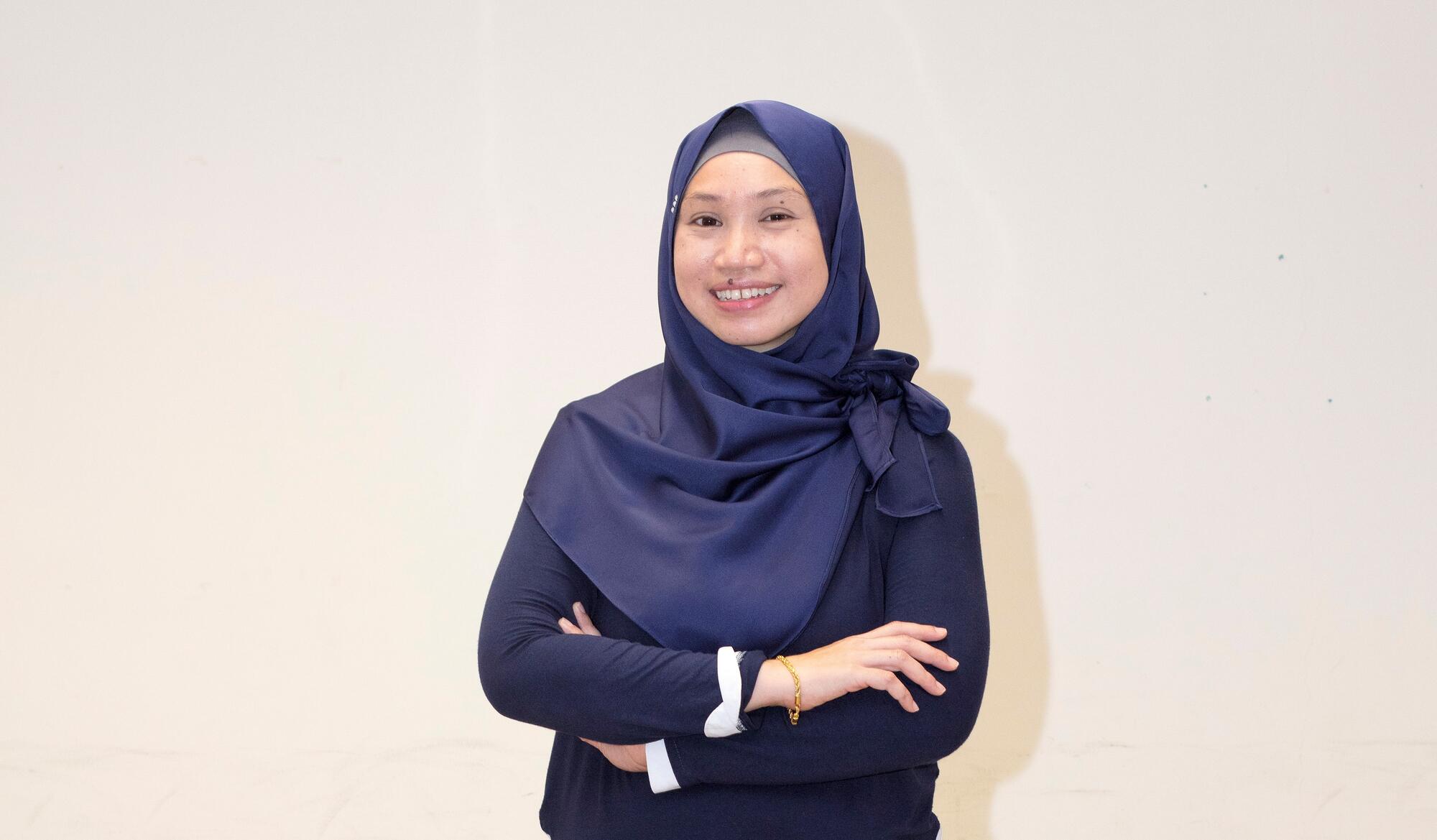Lessons at Zhenghua Primary School don’t follow an expected script. In a recent English language lesson about noun phrases, the class was turned into an ‘escape from Jurassic Park’ experience, complete with virtual dinosaurs attacking a jeep, an indoor sandpit concealing toy dinosaurs, and teachers acting as park rangers.
As their English Language teacher, Mdm Tay Jia Lin, exhorted students to “… think fast, work together, every decision counts to determine your escape,” students sprang into action, excitedly, working in teams to complete their tasks. Along the way, they solved puzzles, helped one another trouble-shoot problems with their VR goggles, and even came up with new ways to describe the prehistoric beasts, as having “loud, raspy breathing,” and “cold, slit-shaped eyes”.

At this English lesson, students take turns experiencing a 360-degree immersive escape from a T-Rex. They figure out the technology together and problem-solve issues.
“We wanted to increase the student voice and agency, and student leadership, and get them to take initiative.” The aim, she says, is to ready students for what lies ahead. “The world is unpredictable. The only way to prepare our students for the future is to equip them with transferable skills that are important for life and work, while grounding them in values.”
This approach means that 21CC is a key consideration for teachers at Zhenghua Primary when designing students’ learning experiences, whether it is the academic subjects, the Applied Learning Programme or CCA.
Fewer worksheets, more hands-on problem-solving
The 21CC framework was introduced by MOE in 2010 to guide schools in developing students for an increasingly complex world. It spotlights key qualities that students need to develop in an ever-changing world. This framework, which is updated in keeping with the needs of times, includes areas such as adaptive and inventive thinking, communication, collaboration, civic literacy etc. – dispositions that will help students thrive in a volatile world. This framework has been adopted by schools from the primary to the pre-university level, cutting across academic and non-academic domains.

This infographic outlines the framework for 21st Century Competencies and student achievements.
Looking back on her own life, Mrs Loke notes that her music teacher, Ms Kon Mei Leen, was practising a version of 21CC way back in the 1980s, before the framework was created. As a student in the Music Elective Programme at Methodist Girls’ School, Mrs Loke recalls that “Ms Kon encouraged us to collaborate, create, and present our original musical compositions to showcase our understanding and application of musical concepts”.
We’re dedicated to equipping our students for lifelong learning and future readiness in our rapidly changing world; 21CC is integral to our school vision and values – empowering students with agency is crucial for developing these skills.
Mrs Constance Loke
“We’re dedicated to equipping our students for lifelong learning and future readiness in our rapidly changing world; 21CC is integral to our school vision and values – empowering students with agency is crucial for developing these skills,” she asserts.
“When teachers plan their lessons, they consider the learning outcomes of the subject, ensuring that they align with 21CC,” says Mrs Loke. For instance, in Maths, the teachers engage students in active problem-solving rather than just doing worksheets. This, says Mrs Loke, encourages students to articulate their thought processes to their peers, and fosters a collaborative learning environment, as opposed to solely relying on the teacher to provide solutions.
Helping students find their voice – from party planning to seed dispersal
In a recent Primary 6 Science lesson, they delved into the topic of seed dispersal in plants. Mrs Loke says with enthusiasm, “Students took on the role of young scientists, designing experiments, formulating hypotheses, and selecting specific factors to investigate. When it was time to present their findings, they engaged in friendly debates about the fairness of their experiments and offered thoughtful assessments of their peers’ work.”
Success can sometimes hinder innovation. If we teach students to use set formulas, it can limit their problem-solving skills. But teaching them to think for themselves empowers them to tackle unfamiliar challenges.
Mrs Constance Loke
Through the ALP, students learn to set goals, voice ideas, brainstorm, make presentations, and reflect, among other skills. They also journal their learning and assess their own growth in 21CC using a self-assessment tool.
“The 21CC rubrics we created are like aspirational checkpoints,” explains Ms Poon Mei Ming, Head of Department of Curriculum and Talent Development, who co-designed the programme with various departments for a coherent student experience. “They help students understand what it means to be competent in a specific skill area and give them a clear idea of what to aim for.”
The ALP is the main platform through which the school assesses 21CC in its students, and the results have been positive. “Students collaborate well on their value creation projects, actively providing feedback on classmates’ responses through Padlet or the SLS Interactive Thinking Tool platform. In fact, in their 21CC self-assessment, students rated their collaboration skills the highest and have also been observed by our community partners to display creative and innovative thinking,” says Ms Poon.
 Primary 5 student Boobathy Harish (left) and Ming Hansong tackle the problem of wet items being thrown into recycling bin for their ALP project. From their discussions, they decided to create a “smart bin”, using Lego bricks, which could inform the user when inappropriate items are tossed inside.
Primary 5 student Boobathy Harish (left) and Ming Hansong tackle the problem of wet items being thrown into recycling bin for their ALP project. From their discussions, they decided to create a “smart bin”, using Lego bricks, which could inform the user when inappropriate items are tossed inside.
Putting students in charge of what and how they learn
On these Self-Directed Learning days, teachers assign learning tasks and serve as resource persons for students’ learning instead of ‘teaching’ them. Students decide which tasks they want to do and when. Some take on the difficult ones first and the simpler ones later or vice versa. They also decide if they wish to consult their teachers.
If there was something we learnt, it was that students can learn, without teachers always being beside them. They are capable of learning themselves.
Mrs Constance Loke
So, once or twice a term, teachers form groups and collaborate on various student or staff issues across the entire school, regardless of department. Teachers decide who to collaborate with and on what topic.
“In the first year we attempted this, some teachers came together for a baking activity. They later used baking to teach Mathematics, Science, and English,” says Mrs Loke, adding that this is an example of how their initial interest in baking for staff well-being translated into valuable student learning experiences.
She adds, “Sometimes, to change mindsets, you start by changing the way you teach. When you see this positively affecting students, mindsets shift.”
Meaningful learning and exam prep go hand-in-hand
“We believe that all learning is social and emotional, so students remember what they learn for a long time. When they engage in exciting and emotionally connected activities, they remember and can use what they learn for years. It enhances learning and gives students more to write and talk about.”
Beyond exams, these competencies will equip students to take on challenges they may face in the future. “You never know how much the teachers and the students can accomplish when you give them the autonomy, the agency and support,” she says, adding, “I believe that not everything crucial can be quantified, but it can be observed and felt.”
Every time, she walks around the school and sees the raised hands in class, the many questions, the “productive noise” emanating from the group discussions, she knows her team is doing something right.






